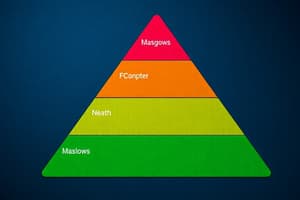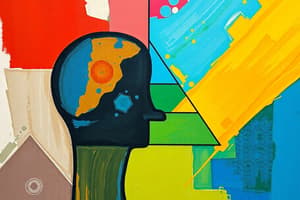Podcast
Questions and Answers
What defines psychological health positively?
What defines psychological health positively?
- Presence of wellness (correct)
- Ability to manage stress
- Absence of disease
- Lack of negative thoughts
Which stage in growing up is associated with the conflict of 'Trust vs. Mistrust'?
Which stage in growing up is associated with the conflict of 'Trust vs. Mistrust'?
- 3-6 years
- 1-3 years
- Birth - 1 year (correct)
- Adolescence
What is the highest level of growth in Maslow's hierarchy?
What is the highest level of growth in Maslow's hierarchy?
- Self-actualization (correct)
- Safety
- Self-esteem
- Belonging
At which stage do individuals learn to balance industry without feeling inadequate?
At which stage do individuals learn to balance industry without feeling inadequate?
Which conflict is associated with learning to live intimately with others?
Which conflict is associated with learning to live intimately with others?
Who are significant people during the 'Autonomy vs. Shame and Self-Doubt' stage?
Who are significant people during the 'Autonomy vs. Shame and Self-Doubt' stage?
During which conflict is the development of a conscience emphasized?
During which conflict is the development of a conscience emphasized?
What is NOT a focus during the Middle adulthood stage?
What is NOT a focus during the Middle adulthood stage?
What describes an identity crisis?
What describes an identity crisis?
What is a common trait of cognitive distortion?
What is a common trait of cognitive distortion?
What does rationalization refer to in coping mechanisms?
What does rationalization refer to in coping mechanisms?
Which of the following is NOT a characteristic of anxiety disorders?
Which of the following is NOT a characteristic of anxiety disorders?
What defines obsessive-compulsive disorder (OCD)?
What defines obsessive-compulsive disorder (OCD)?
What best describes mood disorders?
What best describes mood disorders?
Which statement about bipolar disorder is accurate?
Which statement about bipolar disorder is accurate?
What is a hallmark of agoraphobia?
What is a hallmark of agoraphobia?
What is seasonal affective disorder (SAD)?
What is seasonal affective disorder (SAD)?
What does self-talk refer to?
What does self-talk refer to?
How does denial function as a defense mechanism?
How does denial function as a defense mechanism?
What represents passive-aggressive behavior?
What represents passive-aggressive behavior?
What does the concept of values encompass?
What does the concept of values encompass?
What aspect does assertiveness incorporate?
What aspect does assertiveness incorporate?
Flashcards are hidden until you start studying
Study Notes
Psychological Health
- Psychological health is defined as the absence of disease or the presence of wellness.
Maslow's Hierarchy
- Maslow's hierarchy of needs is a theory that proposes that people are motivated by a hierarchy of needs.
- The needs at each level are prioritized, and the individual cannot truly reach the next level until needs in the previous levels are met.
- The needs in the hierarchy are:
- Physiological needs: These are the basic needs for survival, such as food, water, shelter, and sleep.
- Safety needs: These are the need for security and protection from harm.
- Love and belonging needs: These are the needs for love, affection, and belonging.
- Esteem needs: These are the needs for self-esteem, confidence, achievement, and respect from others.
- Self-actualization needs: These are the needs for personal growth, fulfillment, and the realization of one’s potential.
Self-Actualization
- Self-actualization is the highest level of growth.
- Self-actualized people share certain qualities:
- Acceptance - they are realistic and accepting of themselves and others.
- Spontaneity - they are natural and spontaneous in their behavior.
- Problem-centered - they are focused on solving problems rather than dwelling on them.
- Autonomy - they are independent and self-sufficient.
- Continued freshness of appreciation - they are able to appreciate the simple things in life.
- Peak experiences - they are capable of having intense, profound experiences that are often spiritual or mystical in nature.
- Social interest - they are concerned with the welfare of others.
- Profound interpersonal relationships - they have deep and meaningful relationships with others.
- Democratic character structure - they are open to other peoples’ ideas and opinions.
- Non-hostile sense of humor - they have a sense of humor that is not mean-spirited or aggressive.
- Resistance to enculturation - they are not easily swayed by the opinions of others.
What Psychological Health is Not
- Psychological health is not the same as being happy all of the time.
- Experiencing emotions other than happiness is a normal part of life.
Growing Up Psychologically
- Erikson’s Eight Stages of Development describes a person’s journey through life from infancy to old age.
- At each stage, there is a crisis that needs to be resolved.
- Whether the task of each stage is resolved successfully or not will affect the individual’s personality.
Developing an Adult Identity
- Developing your identity is crucial for moving forward in life.
- For a young adult, this may involve pursuing educational goals, choosing a career path, and establishing romantic relationships.
Identity Crisis
- An identity crisis is a period of uncertainty about who you are and what you want out of life.
Developing Intimacy
- Developing Intimacy is an important milestone in adulthood. It is about the ability to open up and share yourself with another person on a deep level.
Developing Values and Purpose
- Values are the criteria for judging what is good or bad and underlie a person’s moral decisions and behavior.
- Living according to your values will lead to a fulfilling life.
Striving for Spiritual Wellness
- Spirituality refers to the search for a sense of meaning and purpose in life.
- Spirituality includes practices like:
- Meditation
- Prayer
- Nature walks
Achieving Healthy Esteem
- Self-esteem is how you think about and value yourself.
- It affects your actions and your overall happiness.
Developing a Positive Self-Concept
- Your self-concept is your overall idea of who you are.
- This includes your thoughts, feelings, behaviors, and beliefs about yourself.
Meeting Challenges to Self-Esteem
- Challenges to self-esteem can come from various places, including from your thoughts, feelings, and beliefs about yourself.
Cognitive Distortions
- Cognitive distortions are negative thinking patterns that make events seem worse than they are.
Self-Talk
- Self-talk refers to the statements you make to yourself.
- This can either be positive or negative self-talk.
- Negative self-talk is detrimental to self-esteem and can lead to negative emotions and behaviors.
Defense Mechanisms
- Defense mechanisms are mental devices used to cope with conflict or anxiety.
Being Optimistic
- Being optimistic can help you achieve your goals and lead a more fulfilling life.
Maintaining Honest Communication
- Honest communication is the key to building strong relationships.
- Assertiveness allows you to express your needs and opinions without aggression.
Dealing with Loneliness
- Loneliness is a common human experience and can be addressed by connecting with others.
Dealing with Anger
- Anger is a normal emotion.
- Excessive or prolonged anger can be detrimental to your physical and mental health.
Managing Your Anger
- Learning effective ways to manage your anger is an important skill.
- Here are some strategies for managing anger:
- Deep breathing exercises
- Focusing on non-angry thoughts
- Talking to a trusted friend or therapist
Dealing with Anger in Other People
- Effective communication and understanding are important in handling anger in others.
Psychological Disorders
- Psychological disorders affect thoughts, emotions, and behaviors and often interfere with the ability to function in everyday life.
Anxiety Disorders
- Anxiety is a feeling of fear that is not directed toward any definite threat.
Simple (Specific) Phobia
- A simple (specific) phobia is an excessive fear of a specific object, activity, or situation.
Social Phobia
- Social phobia is an excessive fear of being observed in public.
Panic Disorder
- Panic disorder is a syndrome of severe anxiety attacks accompanied by physical symptoms.
Agoraphobia
- Agoraphobia is an anxiety disorder characterized by fear of being alone, away from help, and avoidance of many different places and situations.
Generalized Anxiety Disorder (GAD)
- Generalized Anxiety Disorder (GAD) is an anxiety disorder characterized by excessive, uncontrollable worry about all kinds of things.
Obsessive-Compulsive Disorder (OCD)
- Obsessive-compulsive disorder (OCD) is an anxiety disorder characterized by uncontrollable, recurring thoughts and the performing of irrational rituals.
Obsession
- An obsession is a recurrent, irrational, unwanted thought or impulse.
Compulsion
- A compulsion is an irrational, repetitive, forced action, usually associated with an obsession.
Behavioral Addiction
- A behavioral addiction is an activity or a behavior that is maladaptive and persistent despite the negative consequences.
Post-Traumatic Stress Disorder (PTSD)
- PTSD is a disorder characterized by reliving traumatic events through dreams, flashbacks and hallucinations.
Treating Anxiety Disorders
- Many effective treatments are available for anxiety disorders.
- Psychotherapy
- Medications
- Lifestyle changes
Mood Disorders
- Mood disorders are emotional disturbances that are intense and persistent enough to affect normal function.
Depression
- Depression is a mood disorder characterized by loss of interest, sadness, hopelessness, loss of appetite, disturbed sleep, and other physical symptoms.
Treating Depression
- Effective treatments are available for depression including:
- Therapy
- Medication
- Electroconvulsive Therapy (ECT) - the use of electric shock to induce brief, generalized seizures; used in the treatment of severe depression
- Lifestyle changes
Seasonal Affective Disorder (SAD)
- SAD is a mood disorder characterized by seasonal depression, usually occurring in winter when there is less daylight.
Mania
- Mania is a mood disorder characterized by excessive elation, irritability, talkativeness, inflated self-esteem, and expansiveness.
Bipolar Disorder
- Bipolar disorder is a mood disorder characterized by alternating periods of depression and mania.
Schizophrenia
- Schizophrenia is a psychological disorder that involves a disturbance in thinking and in perceiving reality.
Models of Human Nature and Therapeutic Change
- Several models of human nature and therapeutic change exist:
- The biological model
- The psychodynamic model
- The cognitive-behavioral model
- The humanistic model
The Biological Model
- The biological model emphasizes the role of biological factors, such as genetics, neurotransmitters, and brain structure, in psychological disorders.
Pharmacological Therapy
- Pharmacological therapy is the use of medications to treat psychological disorders.
Placebo
- A placebo is a chemically inactive substance that a patient believes is an effective medical therapy for their condition.
Studying That Suits You
Use AI to generate personalized quizzes and flashcards to suit your learning preferences.




